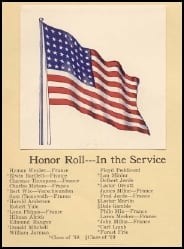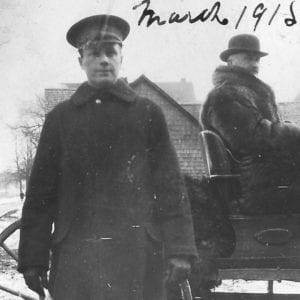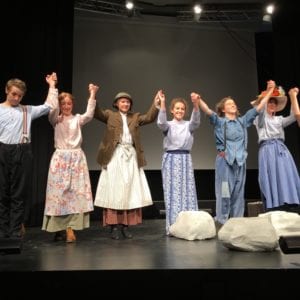Crossing Stones
Frances Foster Books / Farrar, Straus and Giroux / Macmillan,
09/29/2009
192 pages, Ages 12 and up
ISBN 9780374316532
It’s 1917–Muriel Jorgensen is not happy that all the boys she knows are heading overseas to fight in the war we now call World War I. Her teacher and her mother think she should be careful in expressing her opinions, and even her best friend Emma doesn’t share her belief that women should have the right to vote.
In poems spoken in the voices of Muriel, Emma, and Muriel’s brother Ollie, CROSSING STONES takes us through nine months in the lives of two families living on opposite sides of Crabapple Creek in rural Michigan as the war, the women’s suffrage movement, and the flu epidemic alter the lives of the characters and the history of the world.
A note on the beginnings of CROSSING STONES
One October afternoon, I saw a beautiful white farmhouse at the intersection of two country roads; as I continued my drive home, I began imagining who might have lived in the house. My musings became a poem with the title “Suffrage”–an image of a young woman scattering corn for the hens, a letter in her apron pocket. Also in the poem was a suitor who abandoned the girl for someone with more conventional views about the place of women in the world. It was a short poem–twenty lines or so–and the editor to whom I submitted it asked if I could say a little more about it. When I did, he replied that although it was powerful and intriguing, it sounded more like a novel than a poem.
“Too bad I’m not a novelist,” I thought, and tucked the poem away, not submitting it for publication again, but not quite forgetting about it either.
And then, through the course of fifteen years or so, poetry led me into fiction, and after I had written four novels-in-poems, this girl showed up again, her restless spirit intact, her voice clear, family and friends at her side. Her name was Muriel, and she still had a story to tell. Yes, it was a novel, and now, through poetry, I found that I was able to write it.
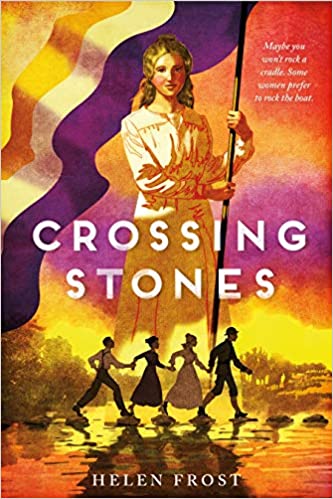
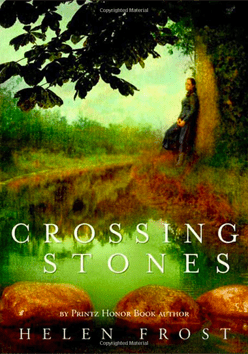
- From the Brookings, South Dakota High School Yearbook, 1917, showing the boys from this one small town who had enlisted in World War I
- WWI family photo
- University students in Freiburg, Germany, perform a play of Crossing Stones. Written by Suzanne Franz, directed by Mechthild Hesse.
- Emma and Ollie’s first kiss
- high school audience
Quotes from Reviews
Dear Ms. Frost,
I teach at a small charter school in New Hampshire. My class consists of about 20 7th and 8th graders. Every other year, when I teach World War 1, a group of my students reads Crossing Stones for their literature circle book. We read the book a few pages at a time and discuss each section as we read. I wanted to let you know how much I appreciate the rich conversations we are able to have around your book. Everything about it is so very thoughtful and intentional. Yesterday, we spent 5 or 10 minutes talking about your dread similes and another 10 minutes talking about what would constitute a happy ending for this book. You’ve given me a vehicle to talk about historical details such as American sentiment about the war, the suffragette movement, shell shock, and the influenza epidemic, but also important themes for middle schoolers like negotiating duty and desire and choosing to follow (or not) what society expects from you. Crossing Stones does all of that while also managing to be a gripping narrative. Few students were able to stop themselves from reading beyond each assignment.
Thank you for writing this treasure of a book!
Sincerely,
Anne Guerriero
Surry Village Charter School
Surry NH
“In the course of less than a year in 1917, two neighboring farming families in Michigan face a sea of troubles. Two sons enlist as the United States enters the First World War; . . . Historically plausible, this . . . could potentially be too much for a single narrative, but Frost contains and reveals her story in a set of tightly constructed poems. Eighteen-year-old Muriel, who is our primary source of information, speaks in an engaging and convincing free-verse stream-of-consciousness style. The other two young adult narrators speak in “cupped-hand sonnets,” a form with a highly stylized rhyme scheme. The discipline of these forms (elaborated upon in an author’s note) mitigates against sentimentality, and the distinct voices of the characters lend immediacy and crispness to a story of young people forced to grow up too fast.” — HORN BOOK (STARRED) November / December, 2009
“Frost. . . once again offers a layered, moving verse novel. Each selection, alternately narrated by Muriel, Ollie, and Emma, is shaped to reflect the characters’ personalities and relationships: Muriel’s free-flowing entries indicate her restless curiosity; Emma and Ollie’s sonnets follow complementary rhyming patterns, adding a structural link between the characters as they fall in love. The historical details and feminist messages are purposeful, but Frost skillfully pulls her characters back from stereotype with their poignant, private, individual voices and nuanced questions, which will hit home with contemporary teens, about how to recover from loss and build a joyful, rewarding future in an unsettled world.” —Gillian Engberg, BOOKLIST (STARRED)
“This gorgeous collection of “cupped-hand” sonnets tells the story of two families whose lives are forever changed by World War I. . .With care and precision, Frost deftly turns plainspoken conversations and the internal monologues of her characters into stunning poems that combine to present three unique and thoughtful perspectives on war, family, love and loss. Heartbreaking yet ultimately hopeful, this is one to savor.” — KIRKUS (STARRED)
“Beautifully written in formally structured verse, Frost’s story spans nine months from 1917 to 1918. Each of three characters’ poems, with their own distinct rhyming schemes and visual shapes, tell about their lives growing up in two families living on either side of a creek in rural Michigan. . . .To help her suffragette aunt recover after being in jail, Muriel travels to Washington DC, and a whole new world is opened up to her. . . . Frost deals with many issues, including the horrors and experiences associated with war: death, mutilation, separation, how the home front coped; gender roles and women’s suffrage; the Spanish influenza outbreak; and discovering what to do with one’s life. At the end in “Notes on the Form,” Frost explains the formal structure of each person’s verse, which is amazingly done. This beautifully written, gently told story can be used for classroom discussion in social studies and English, or simply for leisure reading.” –Jane Van Wiemokly, VOYA (Voice of Youth Advocates)
“. . . this is Muriel’s story, and her determined personality and independence will resonate with readers.” —SCHOOL LIBRARY JOURNAL
“Is it really unpatriotic to speak out in dissent during wartime, to accuse the President of being no better than our enemies? Is it a slap in the face to Americans in uniform?
. . . CROSSING STONES is set ninety years ago during the Great War when “W” stood for Wilson, and the protests outside the White House gates, in which Muriel’s Aunt Vera is participating and for which she is getting arrested, focus on women demanding the right of self-determination — the right to vote.
. . . CROSSING STONES is a great piece of historical fiction and a great coming of age story with some big surprises, some hints of budding romance, some tragedy, a hunger strike, and The Flu.
But this is Helen Frost writing, so that is all just the beginning of the story.
One of my oldest, dearest friends in the world is a craftsperson who knits sweaters that are works of art and, now and again, works in various other artistic media. I have witnessed the time and focus and planning and more time that goes into the execution of her finished projects. It is a process of which I am in awe.
It is that process that I think of when I look at how Helen Frost crafts one of her verse novels to be both a great story and a perfectly-worded poetic work of art.
I love when a thoughtful and well-educated young person becomes a river of change. Muriel’s search for what life may offer beyond the cycle of seasons and farm chores illuminates a long-ago step in the historical quest that continues for American women today in the Twenty-first century. Throughout her travels, Muriel is so authentic and likeable in how she sometimes second-guesses herself, how she comfortably embraces her nurturing instincts while quietly and firmly rejecting her mother’s antiquated thinking about women’s roles, and how, in the face of chauvinistic drivel, she is a girl who is not afraid to take a punch.” —Richie Partington, MLIS, Richie’s Picks



